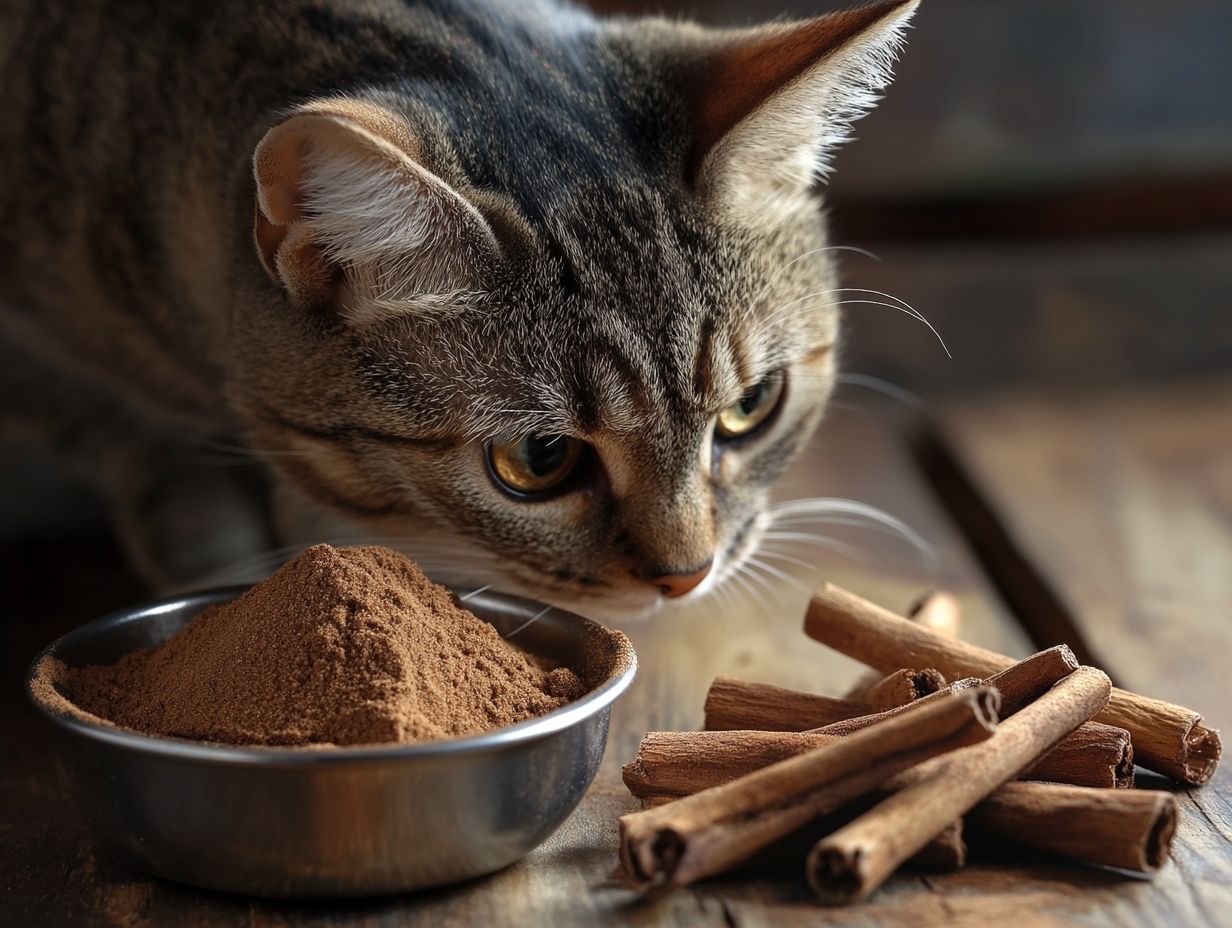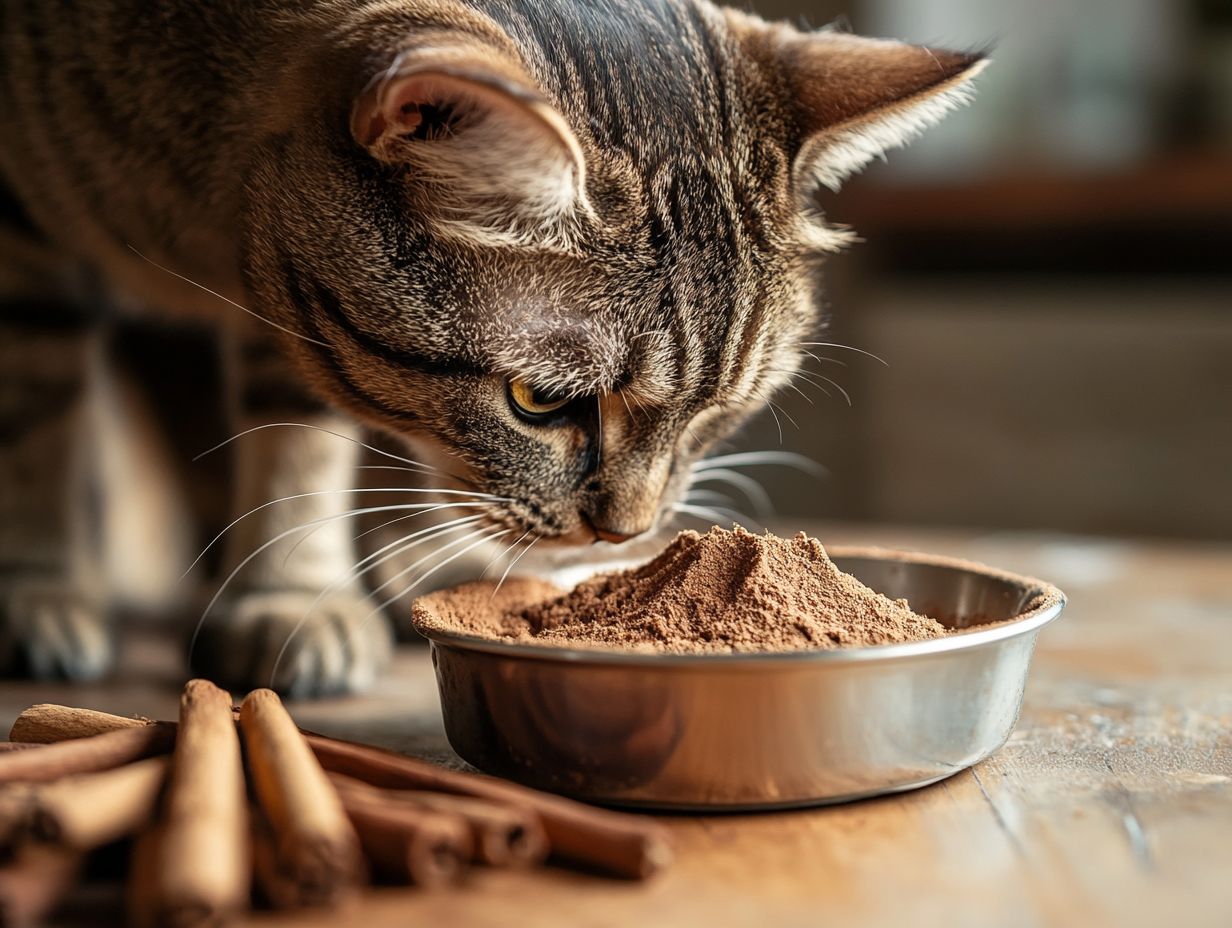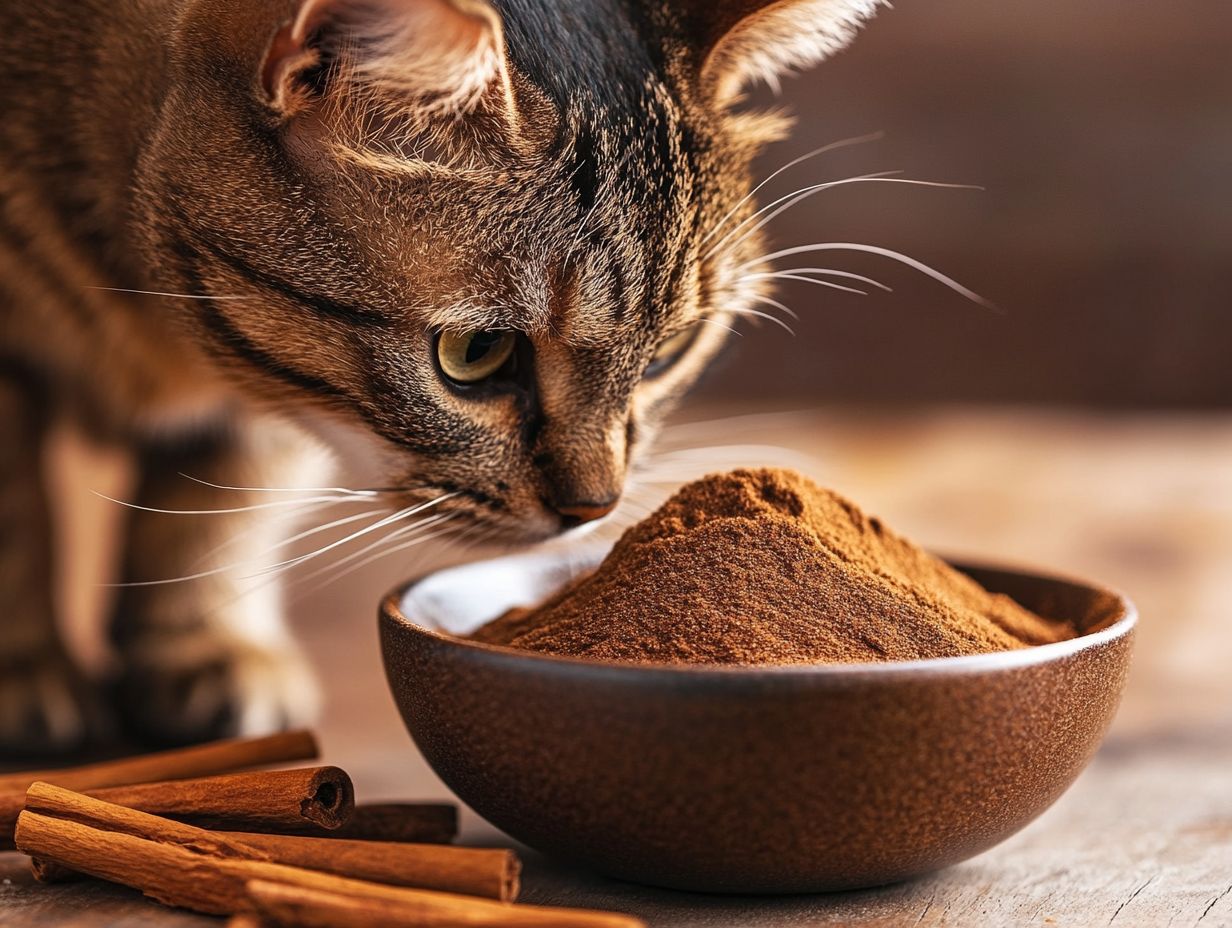Can cats eat cinnamon? This is a question many pet owners ponder. Cinnamon is a popular spice known for its delightful flavor and potential health benefits for humans. In this article, we explore the nutritional benefits and potential risks of cinnamon for cats. We’ll discuss whether cats can safely enjoy this aromatic spice, important factors to consider, potential side effects—including exposure to cinnamon essential oil—and how to incorporate cinnamon into their meals responsibly.
Additionally, we will share alternative herbs and spices that are safe and nutritious for your cat, considering advice from professionals like Debra Eldredge, DVM, and resources from the ASPCA. Dive in to learn how to treat your pet while keeping their health in mind!
Key Takeaways:

- Cinnamon can provide nutritional benefits for cats; however, it poses potential risks.
- Monitor your cat for adverse reactions or allergies to cinnamon after introducing it into their diet.
- If you choose to incorporate cinnamon, start with a very small amount (e.g., 1/8 teaspoon) mixed into their food and consult your veterinarian for safe alternatives like parsley or turmeric.
The Role of Cinnamon in a Cat’s Diet
Cinnamon is a complex addition to a cat’s diet, offering benefits such as anti-inflammatory properties and antioxidants. The two main types—Ceylon and Cassia—have different levels of coumarin, which can be harmful in excessive amounts. It is essential to weigh these benefits against the potential health implications, including allergic reactions and other medical issues.
Nutritional Benefits
Cinnamon offers various nutritional benefits, such as anti-inflammatory properties and antioxidants that may reduce inflammation and help improve blood sugar levels, which may be beneficial for conditions like diabetes.
Potential Risks
Nonetheless, the risk of coumarin toxicity is significant, as excessive intake can damage the liver and contribute to severe health issues. Since coumarin and other toxic substances can sometimes be in food products that are otherwise safe for pets, it is crucial for pet owners to consult a veterinarian before introducing new items into their pets’ diets.
Can Cats Eat Cinnamon?
The question of whether cats can eat cinnamon is complex. Some types may be safer than others. Consider factors such as duration of exposure, potential ingestion of essential oils, the cat’s internal health, and external dietary influences. Consulting the Pet Poison Helpline for guidance is advisable.
Factors to Consider

When considering adding cinnamon to your cat’s diet, it is essential to take into account the cat’s overall health, any existing medical issues, the potential risk of allergies, and monitoring weight changes due to cinnamon exposure. Discuss these factors with a veterinarian to ensure safe dietary choices. For more information, you can read about whether cats can safely consume cinnamon in this article: Can Cats Eat Cinnamon? Is It Safe for Your Cat?
Pet owners should be particularly aware that certain conditions, such as diabetes, can complicate dietary decisions. Introducing new food components without professional guidance may lead to complications. Some cats may also develop allergic reactions to cinnamon, resulting in symptoms like vomiting or irritation.
A gradual introduction of cinnamon, along with close observation, is crucial. Monitor for behavioral or physical changes in your cat after exposure to cinnamon, such as signs of nausea or changes in heart rate. Regular veterinary consultations provide tailored advice to support your pet’s health and foster a better relationship with their diet. Resources like PangoVet can also assist in understanding cats’ reactions to cinnamon.
Potential Side Effects of Cinnamon for Cats
While some cats may tolerate cinnamon, others may have severe reactions. It is crucial to consult with a veterinarian before introducing any new foods, including cinnamon, into your pet’s diet.
Conclusion
In summary, while cinnamon can offer certain benefits for cats, it also presents potential risks that must be carefully considered. Always consult with a veterinarian before introducing new foods to ensure the safety and well-being of your feline friend.
Cinnamon is not generally considered safe for cats, as it can cause allergic reactions and other health issues. While small amounts may offer potential benefits, such as anti-inflammatory and antioxidant properties, the risks often outweigh these benefits. Cat owners should look for symptoms like nausea, redness, and changes in heart rate after exposure, and consult a veterinarian for personalized advice.
Adverse Reactions and Allergies
Adverse reactions and allergies to cinnamon in cats can manifest in various ways, including symptoms such as loss of appetite, gastrointestinal issues, and skin irritation. This highlights the importance of careful monitoring and veterinary guidance. If your cat shows concerning signs like persistent vomiting or severe lethargy, seek immediate veterinary attention.
These symptoms may seem mild initially but can escalate into severe health problems if left unaddressed. Many cat owners may overlook early signs, such as excessive grooming leading to bald patches or sudden changes in behavior, which can complicate the situation.
Recognizing concerning signs after cinnamon exposure is vital; immediate veterinary consultation is essential if issues arise. Professionals can provide appropriate treatment and advice.
Maintaining a close watch on your cat’s health is a crucial aspect of responsible pet ownership, ensuring that all changes are noted and communicated to the veterinarian.
How to Safely Incorporate Cinnamon into a Cat’s Diet
The dosage and preparation methods for incorporating cinnamon into a cat’s diet should be determined by a veterinarian to ensure it is administered at a safe level and aligns with the cat’s specific dietary needs.
Recommended Dosage and Preparation

The recommended dosage of cinnamon for cats is small, and it is essential to use the correct preparation methods, including opting for Ceylon cinnamon to minimize health risks while enhancing the variety of the cat’s diet.
Ceylon cinnamon is preferred over Cassia cinnamon due to its lower coumarin content, which can be toxic in larger amounts. Most sources suggest adding no more than a quarter teaspoon of Ceylon cinnamon to a cat’s food, preferably mixing it into wet food to improve palatability.
Consult with a veterinarian before introducing any new ingredient, as individual health conditions may influence how well it is tolerated. What may be safe for one cat may not be safe for another.
Alternative Herbs and Spices for Cats
Several safe herbs and spices can enhance a cat’s diet and provide nutritional benefits, making it worthwhile to consider alternatives to cinnamon. Discuss these options with your veterinarian.
Safe and Nutritious Options
- Catnip: Promotes relaxation and stimulates playfulness.
- Parsley: Rich in vitamins A, C, and K, supporting overall health and digestion.
- Basil: Contains anti-inflammatory properties and antioxidants that enhance the immune system.
To incorporate these herbs, begin by offering small quantities mixed into their regular food or as a treat, while closely observing their reactions. Gradual introduction helps ensure that any dietary changes are well-tolerated, facilitating a smooth transition to a varied and wholesome diet.
Frequently Asked Questions
Can cats eat cinnamon?

Yes, cats can eat cinnamon in small amounts, but large amounts are not recommended.
Is it safe for my cat to eat cinnamon?
In small doses, cinnamon is generally safe for cats. However, it is important to monitor your cat’s reaction and consult with your veterinarian before giving them any new foods.
What are the benefits of feeding cats cinnamon?
Cinnamon has anti-inflammatory and antioxidant properties which may provide some health benefits for cats, including helping regulate blood sugar levels and improving digestion.
What are the risks of cats eating too much cinnamon?
Excessive consumption of cinnamon can lead to toxicity symptoms, including vomiting, diarrhea, and lethargy. If you suspect your cat has ingested a large amount of cinnamon, seek veterinary care immediately.
Warning: Signs of cinnamon toxicity include persistent vomiting, severe lethargy, and any unusual behavioral changes. If you observe these symptoms, contact your veterinarian without delay.
Conclusion
In summary, while small amounts of cinnamon may have some benefits, they are often outweighed by the potential risks to your cat’s health. Always consult with your veterinarian before introducing new foods, monitor your cat’s health closely, and consider safer alternative herbs and spices to enhance your cat’s diet.
Many cat owners wonder about the safety of including cinnamon in their cat’s diet. While small amounts can occasionally be safe, large amounts can lead to serious health issues such as stomach irritation, vomiting, diarrhea, and even liver damage. This article explores how to safely incorporate cinnamon into your cat’s diet, offers alternative spices that are beneficial, and highlights important precautions to take.
Safe Ways to Include Cinnamon in Your Cat’s Diet
Cinnamon can be sprinkled on top of your cat’s food in small amounts or mixed with water and given as a treat. A recommended dosage is a pinch of cinnamon (about 1/8 teaspoon) per meal, but start with a small amount and monitor your cat’s reaction closely. Warning: Overconsumption of cinnamon can lead to serious health issues in cats.
Safe Spice Alternatives for Cats
Other spices that are generally safe for cats include turmeric, ginger, and parsley. While these spices can offer health benefits, consult with your veterinarian before introducing any new foods or spices into your cat’s diet. Each of these alternatives has its own considerations; for example, excessive turmeric can cause digestive upset, and ginger should be used in moderation to avoid potential side effects.
In conclusion, while cinnamon can be safely included in your cat’s diet in small amounts, it’s vital to be aware of the risks associated with overconsumption. Always consult with your veterinarian before making any dietary changes for your cat to ensure their safety and health.